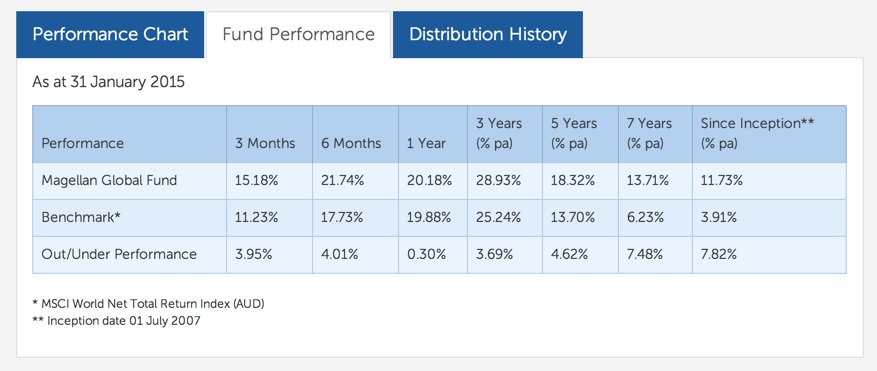Top fund managers: Magellan Asset Management
Summary: The Magellan Global Fund has produced consistent returns over time, which it attributes to bottom-up stock analysis, risk discipline and a focus on broader macro events. The fund looks to invest in companies with sustainable competitive advantages and predictable future earnings. Magellan says that its dual-hurdle performance fee aligns the interests of the client and the investment manager. |
Key take out: Magellan says global markets provide wider opportunity and greater diversification than the Australian market can offer. |
Key beneficiaries: General Investors. Category: Investment Portfolio Construction. |
The Magellan Global Fund is a consistent performer. The fund manages the portfolio to provide an absolute return better than CPI, instead of simply beating a benchmark. This means looking for companies that will be able to keep growing in the years ahead – think Microsoft and Yum! Brands, the owner of Pizza Hut.
And yet the fund has beaten its benchmark, the MSCI World Net Total Return Index (in $A) over the past year, three years, five years, seven years and since inception. The fund has returned 11.73 per cent p.a. since it began on July 1, 2007.

Source: Magellan
Magellan Asset Management's total funds under management have jumped 35 per cent in the six months to December 31, 2014, perhaps indicating increasing interest in global investing. In the second of our series of fund manager interviews, Domenico Giuliano, deputy chief investment officer and portfolio manager of Magellan Asset Management, offers insights into why Magellan Global Fund is a consistent performer.
KS: There are lots of funds investing internationally, what makes Magellan different?
DG: Magellan's investment strategies are absolute return focussed, aiming to provide investors a return materially in excess of CPI over the medium term, while aiming to protect capital on the downside. We understand that investors' life goals are not set to benchmark returns, so we do not target benchmark return goals. Our time horizon is around five years, which lets us look beyond near term market noise and volatility, helping provide value opportunities. Our strategies offer transparency, a quality focus with high conviction, no leverage and no derivatives. Our global equity strategy provides three sources of alpha:
· Intensive bottom-up stock analysis and industry research
· Macroeconomic insights
· Rigorous portfolio construction and risk discipline.
Your outperformance from inception through to the past three years is better than what investors would have got if they had invested in the benchmark. Can you pinpoint this to any specific reasons?
Each of the three sources of alpha (better than average returns) has contributed to our sustained outperformance. For example, our bottom-up stock analysis uncovered the global food conglomerate Yum! Brands, purchased in 2008, having assessed that its highly profitable KFC rollout story in China was far more valuable than the market had assessed. Similarly, for online retailer eBay, we assessed that its rapidly growing PayPal internet payments business was vastly underestimated by the market. We sometimes seek exposure to various industry themes, including the “Cashless Society”, recognising payment methods rapidly moving from cash and cheque towards electronic payments. Our research here suggested faster and more profitable growth; our investments in American Express, MasterCard and Visa have provided very handsome returns.
Lastly, our portfolio construction approach ensures that the portfolio's risk always remains materially below that of the market and that we are not aggregating exposures to certain risks.
You've recently increased your cash holdings, why? What impact do you think this will have on your returns?
We increased the strategy's cash weighting to approximately 10% in August to increase its defensiveness in response to the massive compression in risk premia that has occurred across multiple asset classes over the last 18 months, causing a significant increase in asset prices. We believe there is an elevated probability that this risk compression will unwind over the next 12 months or so as the US Federal Reserve moves towards normalisation of US monetary policy and interest rates. An unwind of the compression of risk premia combined with rising long-term interest rates could lead to a material correction in credit and equity markets.
Now, we may be wrong, or too early in our call. Nonetheless, we believe the relatively small cost of holding additional cash is worth the reduction in risk to the portfolio. We take our aim to reduce the risk of permanent capital loss very seriously.
Can you give some examples of the “outstanding companies” you have invested in? Is there a specific feature outstanding companies pose?
Magellan perceives high quality companies to be those that are able to sustainably exploit competitive advantages in order to continually earn returns on capital that are materially in excess of their cost of capital. Our investment team assesses each prospective investment against the following key criteria, with high quality companies typically exhibiting one or more of the following characteristics:
• Sustainable competitive advantage(s)
• Low agency risk
• Predictable future cash flows and earnings
• High re-investment potential
An example in the technology sector is Microsoft. Around 80% of Microsoft's revenues are derived from its business customers, including the Office productivity software, which has 90% share of the productivity software market. This business earns very high margins and has been growing at around 10% per annum. In the financial sector, Wells Fargo is an example of one of the world's best banks. It touches one in three US households. It has high product diversity, operating over 80 business lines, and has a top three market share position across most of these lines. Its foundation strength is its sticky low cost deposit base of $1 trillion, which allows it to earn superior net interest margins. Checking deposit products help underpin its key strategic focus in cross-selling, with very high product penetration of its retail and commercial customers. High rates of cross-sell enmesh customers into long-duration annuity-like fee streams.
Why do you think self-funded retirees should look to invest some of their funds offshore?
Global markets provide investors with a far wider investment opportunity set that cannot be matched by the domestic market, which is significantly overweight the banking and resources sectors. As a specialist global equities investment manager, Magellan is well placed to exploit these opportunities for the benefit of its clients. Furthermore, global investment can provide greater diversification than an investment in a single country or sector can provide.
What's the reason behind having a performance fee?
A well designed performance fee aligns the interests of both the client and the investment manager. Magellan's performance fees are typically subject to dual performance hurdles and a high watermark. The dual hurdles mean that the Global Equity Strategy's performance must exceed both the 10-year government yield and the MSCI World index. Therefore, Magellan does not earn a performance fee unless the absolute return floor of the 10 year government yield is earned and it exceeds the performance of the global MSCI World benchmark.
Do staff also invest in the fund?
Yes, staff and directors are able to invest in Magellan's funds (as does the company itself), subject to approval in line with Magellan's personal trading policy, while the company also provides a long-term incentive scheme that involves staff investment in the company itself.
Kirstie Spicer is content director at brightday. The Magellan Global Fund is available on the brightday platform.
















